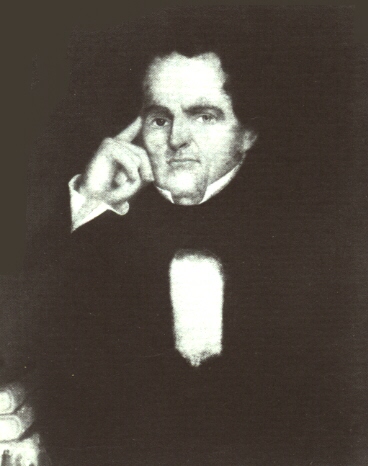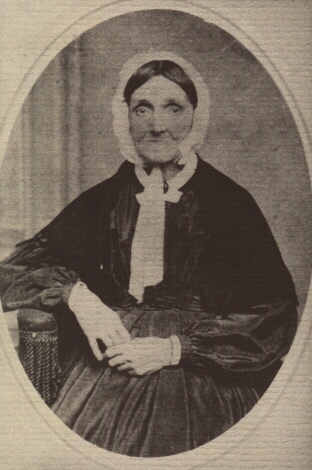|
|
| Ann Arbor, like many cities, has myths and legends surrounding
its origins. Perhaps one of the most persistent over the years has been
the myth of the city's name. The most common story is that Ann Arbor was
named after the wives of the founders, John
Allen (pictured above) and
Elisha Walker Rumsey. Legend has it that Ann
Allen and Mary
Ann Rumsey were fond of sitting under a wild grape arbor built for
them by their husbands. John and Elisha were supposedly so enamored by
the idyllic sight of their wives relaxing in the shade of that arbor, they
decided their newly purchased land should be named "Ann's Arbor," which
was later converted to Ann Arbor. Consider the account by Noah Wood Cheever
written for the Argus in 1902: |
|
When their wives came here, Mr. Allen
and Mr. Rumsey, aided by their wives, built an arbor out of small trees
and bushes on the west side of where the Savings Bank block now stands,
for a temporary home, and the men put a sign upon the front of the arbor,
naming it 'Ann's Arbor', and the village when organized was given that
name. 1
|
|
 |
Another popular story, also recounted by
Cheever, states that the site of the new town was a "burr-oak opening,
having the appearance of an arbor, so they all agreed to call the settlement
'Ann Arbor.'"2 That account fits with a story recorded in a historical
chronology of Washtenaw County. An anonymous author, who claims the story
was handed down to him verbally, tells of one Calvin Chipman being instrumental
in how the city came to be named. However, in this version of the original
naming, the direct credit belongs to Mary Ann Rumsey. She came up with
the idea, playing off her husband's comment about the aesthetic quality
of the area they were located in. The story follows: |
|
Mr. Rumsey occupied the present site of the Episcopal
Church, and, as the story goes, his wife, whose name was Ann, said one
day to her husband, in reply to his remark, "What a beautiful arbor we
have!" "Mr. Rumsey, let's call it Ann's Arbor." 1
|
|
| Immediately after this exchange between husband and wife,
Mr. Chipman put the matter to a vote. All who were present (the story does
not supply names or a count of persons present at the time) voted, and
thus, the name of Ann Arbor was secured. |
|
|
|
| 1. Cheever, Noah Wood. Argus 11 Aug. 1902 2. Same reference as above.
3. Romig, Walter. Michigan Place Names. Detroit: Wayne State University
Press, 1986. pg 25. 4. Bidlack, Russell E. Ann Arbor Sesquicentennial.
Jan, 1974. pg 4. |



